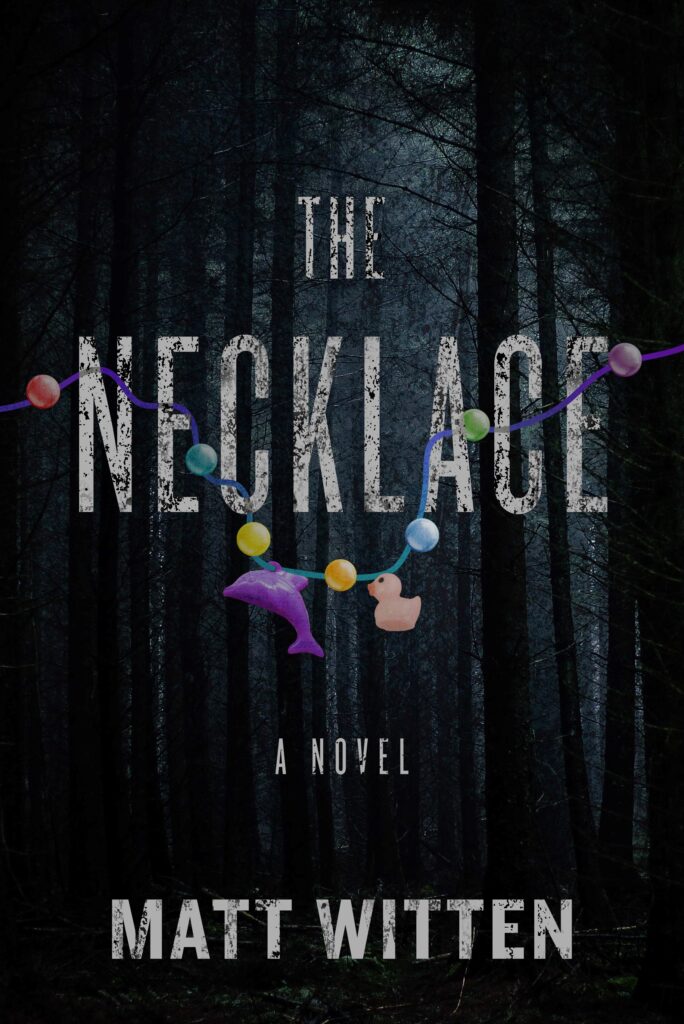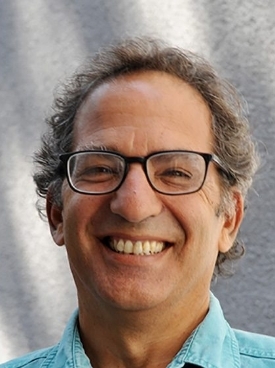 Author Matt Witten is visiting Colloquium for the first time.
Author Matt Witten is visiting Colloquium for the first time.
Matt’s new novel, The Necklace, features a woman who has been beaten down by life. Her only child, Amy, was brutally murdered twenty years ago. Shortly after that, her marriage to Amy’s father, her high school sweetheart, fell apart and he moved away. She has remained in the small town where they grew up, working as a waitress in the same diner and driving the same beat-up car. Now the man who was convicted and sentenced to die is about to be executed, so the local townspeople throw a fundraiser to cover the costs of her travel from New York to a federal penitentiary in North Dakota to witness the death sentence being carried out.
But Susan Lentigo may become an unlikely heroine. She begins to question the condemned man’s guilt, but can she marshal enough evidence to convince the authorities that the wrong man is about to be put to death? She enlists the assistance of the now-retired FBI agent who investigated the case, but as time runs out, she has to fight more than the FBI in her quest to see that her daughter’s real killer is the one who pays for the crime.
Thoughts on Writing
with
Matt Witten
Matt was interviewed by his favorite college professor, Bob Gross, the author of The Minutemen and Their World and The Transcendentalists and Their World. Forty-three years elapsed between Bob’s first acclaimed novel (winner of the Bancroft Prize) and his second, proving that when it comes to writing, perseverance indeed pays off.
You’ve gone from playwriting to crime/mystery novels to TV and movie scripts. In all of them you tell stories. How and when did you develop your interest in narrative?
Like everyone else, I’ve always loved stories. The first stories I remember hearing were from my father when I was a kid. He used to tell tall tales about times when he was in great danger, about to be destroyed by some horrible enemy, and he would cry out in desperation, “Davy Jones!” His agonized plea would resonate down through the sewers and rivers to the bottom of the ocean where Davy Jones was hanging out at his locker with his friend the octopus. Davy would hear my father’s call and immediately race upward through the ocean, burst on the scene, and save my father just in the nick of time.
My father told another story, which I remember vividly to this day, about the time he was captured by cannibals and they were going to turn him into soup. But when they threw him into the pot of water, he kept eating all the vegetables in the pot, and since cannibals don’t like soup with no vegetables in it, they were unable to eat my father, so they let him go. This, by the way, is yet another reason to eat your vegetables!
I knew when I was in first grade that I wanted to be a writer when I grew up. I don’t recall how I came to that conclusion. I wrote my first full-length play when I was in college. It was called Alaska Fire, and was based on a scary campfire story I’d heard about a man in Alaska who comes home from fishing one day and finds his entire family has burned up in a fire. He begins to wonder if he set the fire himself before he left the house in the morning.
Do you see a continuity of interests amid these various genres?
No matter the genre, my work is often “political,” though you can make an argument that all work is political — you’re either fighting injustices or, by ignoring them, you’re supporting them. I like to put my characters in moral quandaries. I like writing stuff that’s meaty, but also has plenty of humor.
Having said that, writing in different genres does bring out different parts of me. My novels sometimes have a character who’s very much my alter ego. For instance, the main character in my four Jacob Burns mysteries is a Jewish aspiring writer with a wife who’s an English professor and two young sons. When I wrote those novels, all of this was true of me. But with writing for the stage, my most successful plays have main characters who are ostensibly very different from me. The hero of Sacred Journey is a homeless Native American man; the main characters in Washington Square Moves are Black ex-cons who hustle chess in Washington Square; and two of the three main characters of The Ties That Bind are lesbians.
With screenplays and TV pilots, I generally gravitate toward crime stories with heart. With characters we care about.
You tell stories about American life. How much did your major in American Studies at Amherst College influence your approaches to our culture and society?
Majoring in American Studies, and being interested in politics and history from a very young age, and the ethical teachings I received from my Jewish upbringing, have been the backdrop for all my work. I try to think deeply about our country and all the different forces, both personal and societal, that affect my characters.
I believe that a great novel, movie, TV show or play has three types of conflict for the main characters: internal, within each character; interpersonal; and societal, where the characters are wrestling with larger social forces. Whenever I write, I try to keep these three different types of conflict in the forefront of my mind.
I still remember the play you wrote for your senior thesis, Alaska Fire. Did that work anticipate your future interests?
The main character in Alaska Fire is a middle-aged man, and the theme is the inevitable discontents of marriage and choosing one path over another in life. What the heck was I thinking, writing that? I was twenty. I’d never had a relationship that lasted more than a year. I had never chosen a path that would be extremely hard to reverse. And yet I stretched my mind and wrote that play.
I’ve continued to reach and explore and stretch throughout my writing life.
Have you worked on any projects for a long time that you have eventually jettisoned? How do you decide what will work and what won’t?
Unfortunately, yes, I have had that experience. I’ve spent six months apiece on two screenplays that never got produced. I’ve spent months writing pilots that never got produced.
And then there was the screenplay I wrote in 1995 and then got paid $86,000 for in 2018, and it may get made one day! Not quite 43 years, but still a pretty long journey.
Nowadays, I really try to be sure a project is viable before I start it. I’ll pitch a one or two-paragraph version to my wife and/or friends and/or members of my writing group. We’ll talk things through, and if the project seems promising, I’ll write up a two-page version (single spaced). If it still seems good, then I’ll write up a five to eight-page version. If it passes that test, I start writing the actual novel or script.
This strategy has worked well for me. I used to sometimes write 20 pages of something and then realize it wasn’t a good idea. That doesn’t happen for me anymore. The keys for me, when choosing a project, are: Is this a book/TV series/movie I’d enjoy reading or seeing? Would I be good at writing it? Do I have something special to contribute? Does this seem likely to be something other people would care about? If the answers to all these questions is yes, then I’m good to go!
Meet Matt

Matt grew up in Baltimore and says he began writing poetry when he was in first grade “about how great the Baltimore Orioles baseball team was, and how terrible the New York Yankees were.” In tenth grade, his drama teacher, on whom he had a crush, suggested he write a play. So of course he did, and it was performed for a local women’s club.
At the age of seventeen, Matt fell ill and swore to remember, should he recover, that “writing is central to who I am and I should never give it up. . . . I held tight to my dream.”
Matt holds degrees from Amherst and Brandeis Universities. For a time, he taught playwriting to inmates at the Greene Correctional Facility while he continued writing his own plays. One of them, The Deal, was about an FBI investigation into small-town political corruption in a small town. His favorite, Sacred Journey, was inspired by a homeless Native American man he encountered in Brooklyn and widely performed.
Matt’s four Jacob Burns mystery novels mirrored his own life at the time. Like him, the main character was a writer married to an English professor at Adirondack Community College, with two boys aged five and three.
Although he never planned to write for television, he penned episodes of Homicide and Law & Order as a freelancer. Soon he and his family moved to Los Angeles where he has spent the past twenty years writing for series including House, Pretty Little Liars, Law & Order, CSI: Miami, JAG, Judging Amy, Women’s Murder Club, The Glades, Medium, and Supernatural. His television scripts have been nominated for an Emmy and two Edgars. He also wrote the script for a movie called Drones. He says he finds it especially fulfilling to watch, with family and friends, a television episode he has written, and contemplate “that millions of other people are also watching my words being performed.”
He hasn’t given up teaching, serving as a part-time TV writing instructor with the UCLA Writers’ Program.
The writers who have most inspired him most are Dr. Seuss because of the freedom with which he wrote and his imagination, and Elmore Leonard for his economy of language and realistic dialogue. Matt has never lost his love of reading thrillers, especially the psychological thrillers that he consumes “like candy,” penned by Gillian Flynn; Harlan Coben; Greer Hendricks & Sarah Pekkanen; Laura Lippman; Jessica Knoll; A.J. Finn; Paula Hawkins; Shari Lapena; Karin Slaughter; Mary Kubica; Lisa Lutz; Ruth Ware; Linwood Barclay; Fiona Barton; Lisa Jewell; JP Delany; Hollie Overton; and others. So he finally decided to write his own thriller and The Necklace is the result. The story is set in Lake Luzerne, New York, where he and his family spend their summers. Matt has found the process of writing on his own “fun. Collaborating on a TV show is fun too, but sometimes it feels good to just sit in your office – or the coffee shop – and write something that’s all yours, that comes totally from the heart, like The Necklace,” published by Oceanview Publishing. It has been optioned for film by Appian Way and Cartel Pictures, with Leonardo DiCaprio set to produce. Matt has already adapted the novel as a screenplay.
Matt’s dream is “to write a novel a year until I’m 80, and then take it from here.”
Connect with Matt at his website, or on Goodreads, Twitter, or Facebook.






Comments are closed.